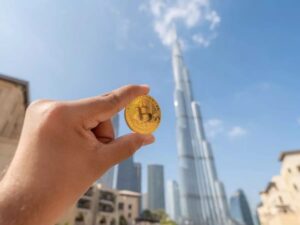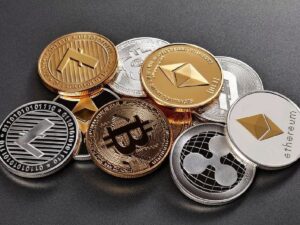History: Evolution of Cryptocurrency
The story of cryptocurrency begins with the enigmatic figure known as Satoshi Nakamoto, who introduced Bitcoin in 2008. Bitcoin was revolutionary—it promised a decentralized form of money, free from the control of governments and banks. In its early days, Bitcoin was met with skepticism and curiosity. On May 22, 2010, a pivotal moment in crypto history occurred when Laszlo Hanyecz made the first real-world Bitcoin transaction, buying two pizzas for 10,000 BTC. This day is now celebrated as Bitcoin Pizza Day, a quirky reminder of Bitcoin's humble beginnings. As Bitcoin gained traction, it inspired the creation of other cryptocurrencies like Litecoin and Peercoin, each bringing unique features to the table. The early 2010s saw a surge in cryptocurrency innovation, with exchanges like Mt. Gox emerging to facilitate Bitcoin trading. However, the industry faced its first major crisis in 2014 when Mt. Gox was hacked, resulting in the loss of 750,000 BTC. The next significant milestone was the launch of Ethereum in 2015. Unlike Bitcoin, Ethereum introduced the concept of smart contracts, allowing developers to build decentralized applications (dApps). This led to a boom in Initial Coin Offerings (ICOs) in 2017, further expanding the crypto ecosystemThe Crypto Landscape Today
Fast forward to today, and the cryptocurrency landscape has transformed dramatically. Bitcoin's value has soared, and new players like Ethereum, Tether (USDT), and USD Coin (USDC) have solidified their positions in the market. Cryptocurrencies are no longer just a tech enthusiast's hobby—they are a significant financial asset class, attracting institutional investors and mainstream attention.Dubai and Cryptocurrency: A Thriving Relationship
Dubai has emerged as a hub for cryptocurrency innovation and adoption. The city's forward-thinking policies and strategic vision have made it an attractive destination for crypto businesses and investors. According to a research report on Crypto in Dubai, the city is home to numerous blockchain and crypto-related initiatives, driven by both private enterprises and government support. Dubai's ambition to become a global leader in blockchain technology aligns perfectly with the dynamic nature of the cryptocurrency market. From the launch of Dubai's Blockchain Strategy to the establishment of crypto-friendly regulations, the city's proactive approach has fostered a vibrant crypto ecosystem. Companies like DubaiOTC and Pallapay are thriving, offering a range of services to meet the growing demand for digital assets. The adoption of cryptocurrency in Dubai in real estate transactions, retail, and even government services highlights Dubai's commitment to integrating this technology into everyday lifeEngaging with Crypto in Dubai
The story of cryptocurrency is not just about technological advancements; it's about people, innovation, and the drive to create a new financial frontier. Whether it's through memes celebrating Bitcoin's highs and lows or interactive social media posts demystifying complex crypto concepts, community engagement is palpable. Platforms like Binance and Huobi have made it easier for individuals in Dubai to buy, sell, and trade cryptocurrencies, further embedding digital currencies into the fabric of the city's economy. So for the most appropriate question- CAN YOU TRADE CRYPTO IN DUBAI? The answer is a resounding yes, thanks to the supportive infrastructure and regulatory environment in place. As we delve deeper into this guide, you'll discover the nuances of investing in cryptocurrency, the best platforms to use, and the exciting opportunities that await in Dubai's burgeoning crypto market. So, buckle up and get ready for an informative journey through the A to Z of cryptocurrency in Dubai.
WHAT IS CRYPTOCURRENCY AND HOW DOES IT WORK?
What is Cryptocurrency?
Cryptocurrency is a digital or virtual currency that uses cryptography for security, making it nearly impossible to counterfeit or double-spend. Most cryptocurrencies operate on decentralized networks based on blockchain technology—a distributed ledger enforced by a network of computers. This decentralized structure allows cryptocurrencies to exist outside the control of governments and central authorities.How Does Cryptocurrency Work?
Understanding how cryptocurrency works involves a few key concepts:-
Decentralization:
-
Blockchain Technology:
-
Mining:
Now let’s understand how cryptocurrency works, with the help of an example:
Suppose, you and your friend are playing a game where you trade marbles. Instead of using physical marbles, you decide to use digital marbles that exist only on your computers. Each time you trade a marble, you both write down the transaction in a shared notebook that everyone playing the game can see. This notebook is like a blockchain, and the digital marbles are like cryptocurrency. Here's a step-by-step breakdown:- Digital Currency: Just like the digital marbles, cryptocurrency exists only in digital form. You can't hold it in your hand like cash.
- Blockchain: The shared notebook where you record every trade is similar to a blockchain. It's a public ledger that records all transactions.
- Decentralization: No single person controls the notebook. Everyone playing the game has a copy, and they all must agree on the transactions. This is what makes cryptocurrency decentralized.
- Cryptography: To ensure that no one cheats by adding fake transactions, you use a secret code (cryptography) to secure each entry in the notebook.
- You open your digital wallet and initiate the transaction.
- The transaction is broadcast to a network of computers (nodes).
- These nodes verify the transaction using cryptographic algorithms.
- Once verified, the transaction is added to a block, which is then added to the blockchain.
- Your friend receives the 1 Bitcoin in their digital wallet.
Real-World Applications:
Cryptocurrencies are not just speculative assets; they have real-world applications:- Cross-Border Payments:
Cryptocurrencies enable faster, cheaper cross-border transactions compared to traditional banking systems.- Decentralized Finance (DeFi):
Platforms like Ethereum enable decentralized financial services such as lending, borrowing, and trading without intermediaries.- Non-Fungible Tokens (NFTs):
Cryptocurrencies power the burgeoning market of NFTs, which represent ownership of unique digital assets like art, music, and virtual real estate.Statistics and Market Data:
As of June 2024, the cryptocurrency market continues to grow: - Market Capitalization: The total market capitalization of cryptocurrencies is over $1.5 trillion, with Bitcoin and Ethereum comprising a significant portion of this value. - Adoption Rates: Approximately 20% of adults in the United States own some form of cryptocurrency. In Dubai, adoption rates are rising as well, with the city becoming a hub for blockchain and crypto innovation. Cryptocurrencies represent a paradigm shift in the way we think about money and financial transactions. With their decentralized nature, security features, and innovative applications, cryptocurrencies are poised to play an increasingly significant role in the global economy.
WHY INVEST IN CRYPTOCURRENCY?
Investing in cryptocurrency can seem complex, but let's break it down into simple, relatable points. Imagine you're considering investing in a new type of digital money, like digital marbles from our previous example. Here are some reasons why you might want to invest in these digital marbles (cryptocurrency):-
High Potential Returns:
-
Diversification:
-
Innovation and Technology:
-
Accessibility:
-
Decentralization:

TYPES OF CRYPTOCURRENCIES AVAILABLE :
Cryptocurrencies can initially seem complex, but breaking them down with professional definitions and simple examples can make them more approachable. Here are four popular types to help you get started.- USDT (USD TETHER)
USDT, or Tether, is a stablecoin pegged to the US Dollar. Its primary function is to provide stability in the volatile cryptocurrency market by maintaining a 1:1 value ratio with the US Dollar. It is widely used for trading and as a means of transferring money with low fees and high speed. For example: Let’s say you have $100 in your pocket. USDT is like having that $100 in a digital format. Each USDT is equivalent to one US Dollar, so it doesn't fluctuate wildly like other cryptocurrencies. For instance, if you have 100 USDT, it’s always worth $100. This stability is why many people convert their other cryptocurrencies into USDT during market downturns to avoid losing money.- BITCOIN
Bitcoin is the first and most well-known cryptocurrency, often referred to as "digital gold." It operates on a decentralized blockchain network, where transactions are verified by nodes and recorded on an immutable ledger. Bitcoin is limited to a total supply of 21 million coins, which enhances its value as a scarce digital asset and hedge against inflation. For Example: Think of Bitcoin as digital gold. Just like gold, which people have trusted for centuries as a store of value, Bitcoin is trusted for its scarcity and security. There will only ever be 21 million Bitcoins, making it rare and valuable. Imagine buying a rare baseball card that you know will not be printed again; because it’s rare, its value can increase over time. Big companies like Tesla and MicroStrategy have bought large amounts of Bitcoin, showing their belief in its value.- USDC
USDC is a stablecoin that is fully backed by reserve assets held in US-regulated financial institutions. It maintains a 1:1 value ratio with the US Dollar, offering transparency and regulatory compliance. USDC is commonly used for trading, payments, and as a safe haven during market volatility. For Example: USDC is similar to USDT but with an extra layer of transparency. Imagine you have $100 in a bank, and this bank openly shows you every day that they have the actual $100 in their vault backing your digital $100. USDC is fully backed by reserve assets held in US-regulated financial institutions, providing trust that each coin is indeed worth one US Dollar. It's a safe option during financial uncertainty, much like keeping your money in a trusted bank.- Ethereum (ETH)
Ethereum is a decentralized platform that supports smart contracts and decentralized applications (dApps). Unlike Bitcoin, which primarily serves as a store of value, Ethereum's blockchain enables programmable transactions and applications across various sectors, including finance, gaming, and art. For Example: Think of Ethereum as a smartphone where you can run various apps. While Bitcoin is like a digital gold bar, Ethereum is like a smartphone that allows you to do many things beyond just holding value. Launched in 2015, it enables smart contracts and decentralized applications (dApps). For example, you can think of Ethereum like the App Store on your iPhone, where developers can create apps for finance, games, or art (like NFTs). This versatility makes Ethereum a hub of innovation in the crypto world.| Cryptocurrency | Launch Year | Creator(s) | Purpose | Blockchain | Use Cases | Distinct Features |
| Bitcoin (BTC) | 2009 | Satoshi Nakamoto | Digital gold, store of value, decentralized currency | Bitcoin | Peer-to-peer transactions, investment | First cryptocurrency, most secure and recognized |
| Ethereum (ETH) | 2015 | Vitalik Buterin | Smart contracts, decentralized applications (dApps) | Ethereum | DeFi, NFTs, dApps | Supports smart contracts and dApps, second largest by market cap |
| Tether (USDT) | 2014 | Tether Limited | Stablecoin pegged to USD, minimize volatility | Ethereum, Tron, others | Hedging against market volatility, trading pairs | Most widely used stablecoin, backed by USD reserves |
| USD Coin (USDC) | 2018 | Centre (Circle & Coinbase) | Stablecoin pegged to USD, minimize volatility | Ethereum, Algorand, others | Hedging against market volatility, trading pairs | Regulated and audited, backed by USD reserves |
Best Crypto to invest in?
When it comes to investing in cryptocurrencies, there is no one-size-fits-all answer. The best cryptocurrency to invest in depends on your requirements, risk tolerance, and investment goals. Here are some factors to consider::Risk Tolerance:
High Risk, High Reward: Cryptocurrencies can be highly volatile. If you're comfortable with significant price swings, you might consider options like Bitcoin (BTC) or Ethereum (ETH), which have shown substantial growth but also experience considerable fluctuations. Low Risk, Stability: If you prefer stability, stablecoins like USDT (Tether) or USDC (USD Coin) might be more suitable. These are pegged to the US Dollar and provide a more stable investment with minimal price volatility.Investment Horizon:
Long-Term: For those looking to invest for the long term, Bitcoin and Ethereum are often considered good choices due to their strong market positions, established networks, and potential for future growth. Short-Term: If your goal is short-term gains, you might look into newer or less established cryptocurrencies, but be prepared for higher risk and volatility.Use Case:
Store of Value: Bitcoin is often referred to as "digital gold" and is considered a good store of value. Its limited supply of 21 million coins makes it a hedge against inflation. Versatility and Innovation: Ethereum is known for its smart contract functionality and supports a wide range of decentralized applications (dApps), making it a versatile investment. Stability for Transactions: Stablecoins like USDT and USDC are excellent for those looking to use cryptocurrency for transactions or as a safe haven during market turbulence. By understanding these factors, you can make a more informed decision that aligns with your financial goals. Always remember to do thorough research and, if possible, consult with a financial advisor before making any investment decisions.
HOW TO INVEST IN CRYPTOCURRENCY IN DUBAI?
- How To Buy Cryptocurrency In Dubai?
Dubai is not just a desert oasis; it’s a burgeoning hub for cryptocurrency investment, catching the world by surprise with its progressive stance. Dubai’s regulatory framework makes it incredibly easy and safe to buy and sell cryptocurrencies, turning it into a magnet for both novice and expert investors. Whether you're looking for quick cash transactions or secure bank transfers, Dubai offers it all. Let’s take a look at a step-by-step guide to know how to invest in Cryptocurrency in Dubai:Choose your currency- Fiat Currencies With Which You Can Buy Cryptocurrencies With:
-
USD (US Dollar)
-
AED (UAE Dirham)
-
EURO
-
INR (Indian Rupee)
Select your Method- Methods to buy Cryptocurrency in Dubai:
-
Cash
-
Bank Transfer
Pick the Right Platform- Best Platforms to Buy Cryptocurrency in Dubai:
-
P2P Platforms
-
OTC Platforms
- How To Sell Cryptocurrency In Dubai?
Choose your Currency- Fiat Currencies with which you can sell cryptocurrencies with:
-
USD (US Dollar)
-
AED (UAE Dhiram)
-
EURO
-
INR (Indian Rupee)
Select Your Method: Methods to sell Cryptocurrency in Dubai:
-
Cash
-
Bank Transfer
-
Managers Cheque
-
SWIFT Payments
-
Wire Transfer
Pick The Right Platform- Best Platforms to Sell Cryptocurrency in Dubai:
-
P2P Platforms
-
OTC Platforms
WHERE TO INVEST IN CRYPTOCURRENCY IN DUBAI?
The right P2P and OTC platforms:
P2P PLATFORMS
-
Binance
- Low Fees: Competitive trading fees.
- Wide Range of Cryptocurrencies: Over 350 cryptocurrencies available.
- Security: Advanced security measures including two-factor authentication.
- Register: Create an account on Binance.
- Verify Identity: Complete the KYC process.
- Deposit Funds: Add funds to your account via bank transfer or credit card.
- Buy/Sell Crypto: Navigate to the trading section, select the cryptocurrency, and execute your trade.
- Withdraw Funds: Transfer your funds to your bank account or crypto wallet.
-
Huobi
- Global Reach: Serves over 10 million users worldwide.
- Security: Robust security measures and insurance for digital assets.
- Diverse Offerings: Supports over 500 cryptocurrencies.
- Sign Up: Register on the Huobi website.
- Complete Verification: Submit necessary documents for identity verification.
- Deposit Funds: Use bank transfer or crypto deposit to fund your account.
- Trade: Choose the cryptocurrency pair and place your buy/sell order.
- Withdraw: Transfer your earnings to your bank or crypto wallet.
-
Bitget
- Copy Trading: Follow and copy trades from elite traders.
- Wide Range of Cryptos: Supports Bitcoin, Ethereum, and over 500 altcoins.
- User-Friendly Interface: Easy-to-navigate platform.
- Create Account: Register on Bitget.
- Verify Identity: Complete the KYC process.
- Deposit Funds: Add funds via bank transfer or crypto deposit.
- Copy Trade: Select a trader to follow and copy their trades.
- Withdraw: Transfer your funds to your bank or crypto wallet.
-
OKX
- Low Fees: Competitive transaction fees.
- Advanced Trading Tools: Powerful APIs and trading options.
- Educational Resources: Guides and tutorials for beginners.
- Register: Sign up on OKX.
- Complete KYC: Verify your identity.
- Deposit Funds: Fund your account via bank transfer or crypto deposit.
- Trade: Use the trading tools to buy/sell cryptocurrencies.
- Withdraw: Transfer your earnings to your bank or crypto wallet.
-
KuCoin
- Extensive Altcoin Support: Over 700 cryptocurrencies available.
- Security: High-level security measures and Proof of Reserves.
- User-Friendly: Easy-to-use platform with a mobile app.
- Sign Up: Create an account on KuCoin.
- Verify Identity: Complete the KYC process.
- Deposit Funds: Add funds via bank transfer or crypto deposit.
- Trade: Select the cryptocurrency pair and execute your trade.
- Withdraw: Transfer your funds to your bank or crypto wallet.
-
Bybit
- Spot and Derivatives: Trade both spot and futures markets.
- Security: Cold wallet storage and triple fund protection.
- User Support: 24/7 customer support.
- Register: Sign up on Bybit.
- Complete Verification: Verify your identity.
- Deposit Funds: Fund your account via bank transfer or crypto deposit.
- Trade: Choose between spot or derivatives trading and place your order.
- Withdraw: Transfer your earnings to your bank or crypto wallet.
OTC PLATFORMS
-
DubaiOTC
- 0% Transaction Fees: No fees for transactions.
- Multiple Cryptocurrencies: Supports USDT, Bitcoin, Ethereum, and more.
- Customer Support: 24/7 support via Telegram.
- Register: Create an account on DubaiOTC.
- Verify Identity: Complete the KYC process.
- Check Rates: Visit their Telegram channel for the latest rates.
- Trade: Connect with support on Telegram to execute your trade.
- Withdraw: Transfer your funds to your bank or crypto wallet.
-
Pallapay
Pallapay is a platform for buying and selling Bitcoin and other cryptocurrencies, offering a payment gateway and POS system.
Key Features:
- Payment Gateway: Accept crypto payments on websites and in-store.
- Multiple Payment Methods: Supports cash, bank transfer, and over 100 cryptocurrencies.
- User-Friendly: Easy to use with minimal setup.
- Sign Up: Register on Pallapay.
- Verify Identity: Complete the KYC process.
- Deposit Funds: Add funds via bank transfer or cash.
- Trade: Use the platform to buy/sell cryptocurrencies.
- Withdraw: Transfer your funds to your bank or crypto wallet.

WHO CAN INVEST IN CRYPTOCURRENCY?
Cryptocurrency is not just for tech-savvy individuals; it offers opportunities for a wide range of people, who can invest in cryptocurrency:-
Traders
-
Investors
-
Property Buyer
-
Real Estate
WHEN TO INVEST IN CRYPTOCURRENCY?
Investing in cryptocurrency can be exciting, but it's important to know when to invest and what factors to consider before diving in. Here’s a simple guide to help you understand the best time to invest in cryptocurrency and what to look for.What Factors Do You Consider When Evaluating Whether To Invest In A Particular Cryptocurrency?
Understand the Project:- Technology and Purpose: Look at the technology behind the cryptocurrency. What problem does it solve? Is it innovative? Understanding the project’s goals can give you an idea of its potential.
- Team: Check who is behind the project. A strong, experienced team can make a big difference in the success of a cryptocurrency.
- Community and Adoption: A large, active community can be a sign of a healthy project. Look at how many people are using or supporting the cryptocurrency.
- Price History: Review the cryptocurrency’s price history to see how it has performed over time. Has it been stable, or is it very volatile?
- Market Position: Check its rank among other cryptocurrencies. Top-ranked cryptocurrencies are generally considered more stable.
- Blockchain Security: Evaluate the security features of the cryptocurrency. Is its blockchain technology secure and reliable?
- Regulation Compliance: Check if the cryptocurrency complies with regulations in your country. Regulatory compliance can impact its future availability and stability.
- Trading Volume: High trading volume means you can easily buy and sell the cryptocurrency without affecting its price much.
- Exchange Listings: Being listed on multiple reputable exchanges can increase a cryptocurrency's accessibility and liquidity.
- Volatility: Cryptocurrencies are known for their price swings. Be prepared for potential ups and downs.
- Risk Tolerance: Consider your risk tolerance. Only invest money you can afford to lose.
How To Know When To Invest In A Cryptocurrency?
Market Sentiment:- Positive News: Good news about partnerships, technological advancements, or regulatory approvals can boost a cryptocurrency’s price.
- Community Buzz: A growing and enthusiastic community can indicate a good time to invest.
- Price Patterns: Learn some basic technical analysis to identify patterns that might indicate future price movements.
- Support and Resistance Levels: Identify key price levels where the cryptocurrency tends to support or resist movement.
- Consistent Investment: Instead of trying to time the market, invest a fixed amount regularly. This strategy helps reduce the impact of volatility.
- Long-Term View: DCA is beneficial if you plan to hold the investment for a long period.
- Global Events: Economic events and regulatory changes can affect cryptocurrency prices. Stay informed about what's happening in the world.
- Affordability: Ensure you are financially stable and not investing money needed for essential expenses.
- Diversification: Don’t put all your money into one cryptocurrency. Diversify your investments to spread risk.

THINGS TO KEEP IN MIND BEFORE INVESTING IN CRYPTOCURRENCY:
Investing in cryptocurrency can be rewarding, but it's crucial to be aware of several important factors before you start. Here’s a straightforward guide to help you understand what you need to consider.1. Educate Yourself
- Learn the Basics: Understand what cryptocurrency is and how it works. Familiarize yourself with terms like blockchain, wallets, and exchanges.
- Do Your Research: Read up on different cryptocurrencies, their use cases, and the technology behind them. Websites like Investopedia and CoinMarketCap are great places to start
2. Prepare for Volatility
- Expect Price Fluctuations: Cryptocurrency prices can change rapidly. Be prepared for significant ups and downs.
- Start Small: If you're new, starting with a small investment might be wise to get a feel for the market without risking too much.
3. Manage Risks
- Only Invest What You Can Afford to Lose: Cryptocurrency can be risky. Never invest the money you need for essential expenses.
- Diversify Your Portfolio: Don’t put all your money into one cryptocurrency. Spread your investments across different assets to reduce risk.
4. Prioritize Security
- Use Secure Wallets: Store your cryptocurrency in secure wallets. There are two main types:
- Hot wallets (online)
- Cold wallets (offline).
- Enable Two-Factor Authentication: Always enable two-factor authentication on your accounts to add an extra layer of security.
5. Choose Reputable Exchanges
- Research Exchanges: Select a reliable exchange with a good reputation, high trading volume, and strong security measures. Examples include Binance, Coinbase, and Kraken.
- Check Fees: Be aware of the trading fees and withdrawal fees that exchanges charge. These can vary significantly from one platform to another
6. Understand the Regulatory Environment
- Know the Laws: Cryptocurrency regulations can vary by country. Make sure you understand the legal requirements and tax implications in your region.
- Stay Updated: Regulations can change, so keep yourself informed about any new laws that might affect your investments.
7. Avoid Scams
- Beware of Scammers: Be cautious of too-good-to-be-true offers and unsolicited investment opportunities. Scammers often target new investors.
- Verify Information: Always verify the legitimacy of a project and the people behind it before investing.
8. Develop a Strategy
- Set Goals: Define your investment goals and how much risk you are willing to take. This will help you make more informed decisions.
- Stick to Your Plan: Once you have a strategy, stick to it. Avoid making impulsive decisions based on market hype or fear.
FUTURE IN CRYPTOCURRENCY:
Cryptocurrency is rapidly evolving, and its future promises a mix of innovation, growth, and challenges. Here are some statistics and real-life examples to paint a picture of where cryptocurrency is headed.Global Adoption and Market Trends
- Increasing Adoption: As of 2021, nearly 300 million people worldwide owned cryptocurrency. This number is expected to grow significantly as more people and businesses adopt digital currencies.
- Market Growth: The cryptocurrency market is projected to reach $4.94 billion by 2030, driven by increased institutional investment and mainstream acceptance.
- Bitcoin and Ethereum: Bitcoin (BTC) and Ethereum (ETH) continue to dominate the market, with Bitcoin's price up 61% and Ethereum up 3.27% in recent years
Real-Life Examples
- Digital Payments: Companies like Tesla and PayPal are accepting cryptocurrency as payment, making it easier for everyday transactions.
- Decentralized Finance (DeFi): Platforms like Uniswap and Aave are revolutionizing finance by allowing users to lend, borrow, and earn interest without traditional banks.
- Blockchain in Supply Chain: Companies like IBM and Walmart are using blockchain technology to improve transparency and efficiency in supply chains.
Future Technological Developments
- Improved Scalability: New technologies like Ethereum 2.0 aim to make blockchain networks faster and more scalable.
- Interoperability: Projects like Polkadot and Cosmos are working on making different blockchains communicate with each other seamlessly
Future of Cryptocurrency in Dubai:
Dubai is quickly becoming a global hub for cryptocurrency and blockchain innovation. The city's government has set ambitious goals, such as making Dubai a blockchain-powered city and establishing the Virtual Assets Regulatory Authority (VARA) to oversee crypto activities. The region's favorable tax laws, strong regulatory support, and business-friendly environment are attracting numerous crypto companies and startups1. Dubai's strategic initiatives, like the Dubai Blockchain Strategy and the Metaverse strategy, are further cementing its role as a leader in the digital economy. With growing adoption among residents and increasing interest from international businesses, Dubai is poised to play a pivotal role in the future of cryptocurrency.FAQ'S:
-
Do you pay tax on crypto in Dubai?
-
Can you buy a property with crypto in Dubai?
-
Can you buy apartments with cryptocurrency in Dubai?
-
Which banks support cryptocurrency in Dubai?
-
What crypto wallet works in Dubai?
-
What is Blockchain?


